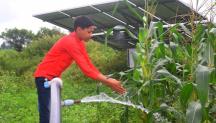

IRENA Examines the Socio-Economic Impacts of Renewables in the MENA Region
Newsletter
On the 19 January, 40 participants from the public and private sector came together with IRENA to discuss the socio-economic impacts of renewable energy, specifically in the Middle East and North Africa regions (MENA). The gathering in itself illustrates a change of focus in the field of renewable energy from the WHY to the HOW, with a growing interest in the social impacts of renewable energy deployment. As highlighted by Anita Richter of the GIZ, renewable energy advocates no longer need to place all their efforts into underscoring why renewable energy ought to be deployed, but rather how this should be done.
Deployment policies are only one part of the equation. The other factors, according to Barbara Breitschopf from Fraunhofer ISI, are the structures that support deployment and those that boost value creation. Just as support mechanisms for deployment ensure that renewable technologies can be integrated into the grid, value creation strategies ensure that renewable energy projects retain their social license to operate. The issue, however, as highlighted by Steffen Erdle from GIZ, is that the knowledge gained from previous projects has only been transferred from North to South and has yet to reach the MENA region.
To fully grasp the socio-economic impacts from renewable energy projects in the MENA region, we must solve one of the key structural issues in this field: data and knowledge transfer. IRENA has begun addressing this issue through the REvalue initiative, including the studies on the Water, Energy and Food Nexus and on the socio-economic benefits of solar and wind energy.
Several representatives from MENA countries agreed that efforts to maximise socio-economic benefits of renewable energy deployment can be strengthened through engagement with local institutions, particularly small and medium enterprises (SMEs). One suggestion involved building on existing SME relationships. Another point highlighted by the participant was the need for expanding capacity building initiatives and embedding renewable energy into education systems.
Another key issue brought forth from this discussion was the timeliness of projects and how this could impact the effectiveness of renewable energy deployment. It is important to consider that in the MENA region, where sustainability is for the most part in a nascent stage, countries may at the same time want to consider issues such as energy efficiency. In this manner, a country could reduce the level of energy demand and set up renewable energy projects in order to meet the planned share of energy from renewables. Overall, the participants concluded that detailed assessments should be carried out before any initiative is begun, in order to evaluate the readiness of a given country for renewable energy projects and determine whether other support policies are needed.
The last session discussed the methodologies and tools available that can be used to assess socio-economic impacts of renewable energy deployment plans. The panel concurred that to gather this information and implement effective policies, both the private and public sectors would need to be involved. Only in this manner, could the availability of data be improved and the added value of renewable energy deployment enhanced.




